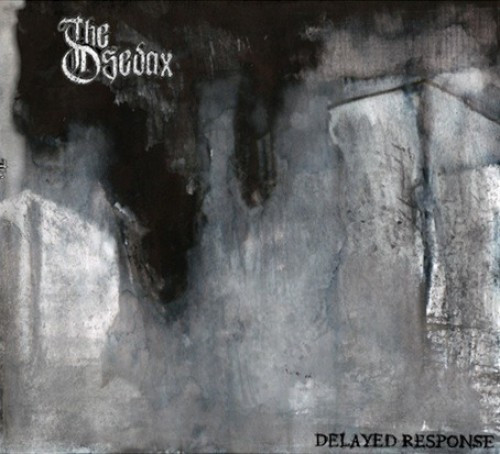
Most metal reviews are littered with cliches and overused words. I’m as guilty as anyone. Sometimes the explanation is laziness, sometimes a lack of imagination, sometimes limitations on the writer’s vocabulary. It’s not all bad, because sometimes the overused words function like a shorthand code: they quickly give readers a very general clue about whether it’s the kind of music that might suit their tastes. On the other hand, some of the words are so imprecise that they simply don’t do the music justice, or they can be downright misleading.
Let’s take “sludge” and “stoner metal”, for example. “Sludge” is a handy word to use, and most metalheads know what it connotes: down-tempo music with distorted guitars, heavy bass rhythms, and an air of doom. Sometimes the word is used in conjunction with “stoner metal”, which I guess happens when the music is less abrasive, maybe more psychedelic, maybe incorporating more instrumental jams, but I’m not 100% sure. By the way, does getting high and losing yourself in the music really correlate with one genre of metal more than another?
Anyway, on the subject of cliched, overused words, one thing I’ve noticed is that reviewers of sludge/stoner music can’t seem to resist throwing around “dirty” and “filthy” as adjectives. What the fuck does that mean anyway? I don’t listen to this kind of music often, but I listen enough to know that bands who wear the sludge/stoner label do not all sound alike, and calling their music “dirty” or “filthy” doesn’t help distinguish them. Does it?
These thoughts are running through my head because I’ve been listening to an excellent debut album called Delayed Response by a Virginia band called The Osedax. Their music gets labeled “sludge” and “stoner” — hell, those are the words the band themselves use. But this is a case where those shorthand codewords really don’t do the music justice — there’s a whole lot more to it than what those labels might make you think. There’s also nothing about it that’s mellow; it’s seriously disturbing. (more after the jump, including a song and a download link . . .)
 Up to a point, the codewords make some sense as applied to The Osedax. These dudes are heavyweight sluggers when it comes to laying down the distortion-dominant riffs. There’s palpable weight to the sonic assault, and the pacing is often at a crawl. I’d be tempted to describe the music as the soundtrack to a consumptive man’s struggle through a pit of sucking tar — except sometimes there’s something heroic about the occasional melodies. Maybe a better metaphor for those songs would be a man attempting to carry the weight of his friends or family up a boulder-strewn mountain to a place that promises safety from murderous pursuers, except there’s no assurance he’ll make it before being crushed by the burden. In other songs, there’s no sense of hope at all.
Up to a point, the codewords make some sense as applied to The Osedax. These dudes are heavyweight sluggers when it comes to laying down the distortion-dominant riffs. There’s palpable weight to the sonic assault, and the pacing is often at a crawl. I’d be tempted to describe the music as the soundtrack to a consumptive man’s struggle through a pit of sucking tar — except sometimes there’s something heroic about the occasional melodies. Maybe a better metaphor for those songs would be a man attempting to carry the weight of his friends or family up a boulder-strewn mountain to a place that promises safety from murderous pursuers, except there’s no assurance he’ll make it before being crushed by the burden. In other songs, there’s no sense of hope at all.
It’s also true that you can indeed get lost in this music, but it’s not a comfortable feeling. It’s like being lost in a black fog and shuddering from the knowledge that there’s something in there with you, something big and fanged that thinks of you as food.
Here are some notes I made about the songs on Delayed Response as I was listening, and then tidied up a bit for this post:
“The Purging”: Starts slow, an atmosphere of dread, fueled by feedback; distortion-heavy chords; the pacing of funeral doom; massively heavy drum-pounding — with a mix of death and black-metal vocals; about half-way through, the pace increases in speed and the guitars begin to ring out in a dark anthem and the drumming increases in complexity – and it ends in the drone of more feedback.
 “Reanamorata”: Feedback again, a shrill squall; more deep, massive chords, the shimmer of cymbals and the great thump of drums. Mid-range, howled vocals. The lead guitar begins to weave an oppressive melody (which hangs around your head long after the song ends). Halfway through – again, the drums begin to increase in complexity, and the lead guitar begins to wail and then to echo, increasing in pitch — still massively distorted. The vocals elevate to a shrieking, and a wall of chaotic noise falls onto your head.
“Reanamorata”: Feedback again, a shrill squall; more deep, massive chords, the shimmer of cymbals and the great thump of drums. Mid-range, howled vocals. The lead guitar begins to weave an oppressive melody (which hangs around your head long after the song ends). Halfway through – again, the drums begin to increase in complexity, and the lead guitar begins to wail and then to echo, increasing in pitch — still massively distorted. The vocals elevate to a shrieking, and a wall of chaotic noise falls onto your head.
“White Noise Transmission”: This song starts faster than the previous two. The drums hammer a tribal rhythm, and the abrasive guitars rage while the vocals shriek in agony. Another dark melody creeps into the performance with some neat, twisted riffing as the drums again become busier. The guitars elevate in range and swirl and swell. This becomes head-whipping music as the song’s midpoint approaches — and then the bottom falls out, the pit looms beneath, and it’s all deep sludge. But here come those ringing guitars again, pealing like a chorus of giant bells, a dissonant but inspiring melody. The pulsing of feedback ends it.
“Intermittance”: A truly fierce drum attack and roaring guitars open this song, raging like caged tigers trying to get through the bars to your defenseless body. Shrieking vocals. Again with the pealing, echoing guitars as the pace diminishes. Then the guitars squeal in a repeating riff and the bass takes the true lead in an instrumental passage, after which the song gradually slows, and slows more, almost to a dead stop, while the music inspires a growing feeling of despair and agony.
 “Transient Progression”: This extended, almost ambient guitar instrumental is a real change of pace. It begins with a surprising, clear, light, echoing guitar arpeggio; the chords drop an octave, becoming more ominous; the bass begins to thrum in the background; and the light and the dark guitar lines join together, until that light melody with which the song began reappears at the end.
“Transient Progression”: This extended, almost ambient guitar instrumental is a real change of pace. It begins with a surprising, clear, light, echoing guitar arpeggio; the chords drop an octave, becoming more ominous; the bass begins to thrum in the background; and the light and the dark guitar lines join together, until that light melody with which the song began reappears at the end.
“Delayed Response”: Bi-tonal feedback; deep roaring vocals and slow, funereal chords; the plodding crush and crash of drums and cymbals; at 2:30 the guitars begin to arc into space with shimmering, reverberating notes and the vocals escalate into shrieking; while the pacing remains slow, the bass emerges strongly beneath the ringing guitars; the high notes of the guitars subside, replaced by groaning, doom-laden chords; at about 6:00, the vocals and the drums stop, and the guitars generate a cascade of noise and fleeting melody to close the song.
“Dissonant Attenuation”: More distorted guitar notes, ultra-slow drums, a mix of low-end death vocals and screaming; barely enough movement to keep the thing going, like a rumbling semi-truck slowly coasting on the fumes of its last cup of gas; at the halfway mark, the bass drones and the guitars pierce the low noise with bursts of shimmering notes; shrieking, pounding, distorted higher-register lead guitar; the upper end of the range disappears and the song proceeds with groaning noise, slow percussive pounding, death vocals; this song never changes pace.
 “Primary Signal”: Atypically rapid tribal pounding, joined by viciously distorted guitars; roaring vocals begin as the lead guitar growls an infectious but menacing riff; this is musical accompaniment for being stretched on a rack until tendons snap and bones disjoint; at about 3:30 the drums and bass stop briefly while the guitars pick out a melody; the drums return along with a bass arpeggio; as the lead guitar continues to clang melodically, the tag-team vocals return, too; the noise again subsides with the lead guitar and solitary drums carrying the song — periodically punctuated by a huge bass chord the smashes down and reverberates and eventually overwhelms everything else with massive groaning feedback (faintly, in the background, agonizing screams can be heard).
“Primary Signal”: Atypically rapid tribal pounding, joined by viciously distorted guitars; roaring vocals begin as the lead guitar growls an infectious but menacing riff; this is musical accompaniment for being stretched on a rack until tendons snap and bones disjoint; at about 3:30 the drums and bass stop briefly while the guitars pick out a melody; the drums return along with a bass arpeggio; as the lead guitar continues to clang melodically, the tag-team vocals return, too; the noise again subsides with the lead guitar and solitary drums carrying the song — periodically punctuated by a huge bass chord the smashes down and reverberates and eventually overwhelms everything else with massive groaning feedback (faintly, in the background, agonizing screams can be heard).
Maybe my tidied-up listening notes qualify as too much information. Maybe less is more. So let’s put it this way: The Osedax have rolled out a phalanx of crushing sludge that’s both seriously disturbing and strangely inspiring, the monolithic weight of relentless doom enlivened by well-placed melodies, the massive walls of crawling distortion pierced by arcing, echoing guitars. Delayed Response is an auspicious debut by a band to watch. Here’s a taste of the music:
PARTING NOTES:
I first came across The Osedax in May 2010, when only a few of these songs had been finished, and I wrote about them then. Visit that post to find out what the band’s name means; it’s a very strange story.
Here’s some good news if you liked that song I picked: In an effort to get their music out into the world, the band have authorized us to provide a link for free download of their album, so click below to do that shit. It’s a big file, so be patient.
Finally, for more info about The Osedax, here are the band’s web pages: Facebook, MySpace, ReverbNation


This reminds me alot of my favorite Sludge Doomsters Thou http://deathmetalbaboon.com/thou
Super find. Goin’ to download now
I just listened to “The Work Ethic Myth” and I hear why you made that connection. Great song — now I have to listen to those others in your post!
I can’t get into the whole sludge/doom/stoner metal thing. Don’t know why. Not saying its bad music or anything, it just doesn’t resonate for me, I guess.
I understand. For me, it totally depends on my mood. I don’t think I could handle a steady diet of music in this genre, but when it’s done well and I’m in the right frame of mind for it, I do like the heaviness of it. I’ve got no use for incessant drone, but that’s not what The Osedax is doing, thankfully.
After a few listens, I want to say Thou meets Matodon meets Ulcerate. Very Nice!
That should say Mastodon….
That’s a damned fine ménage à trois! The Osedaxians should be pleased with that comparison.